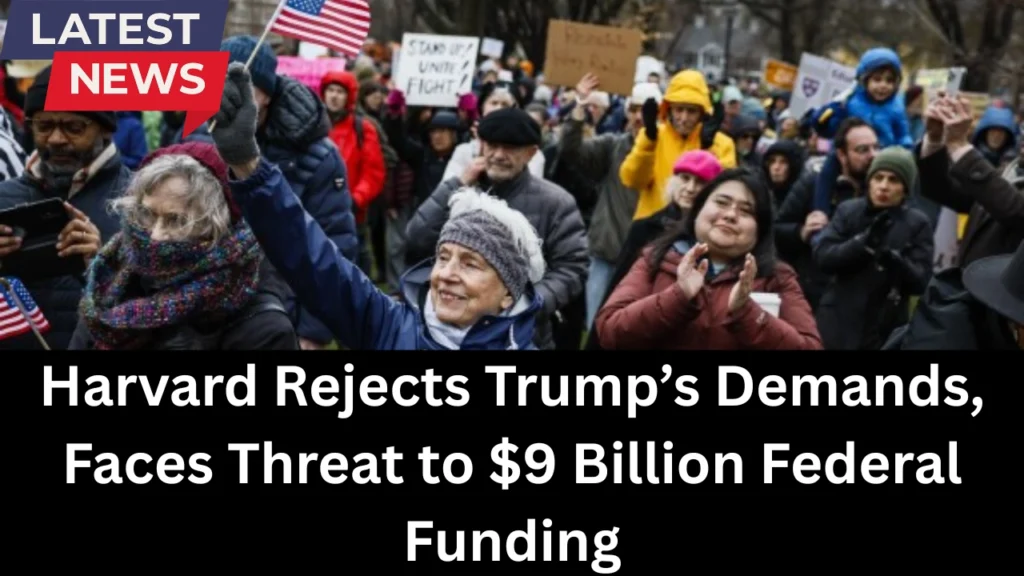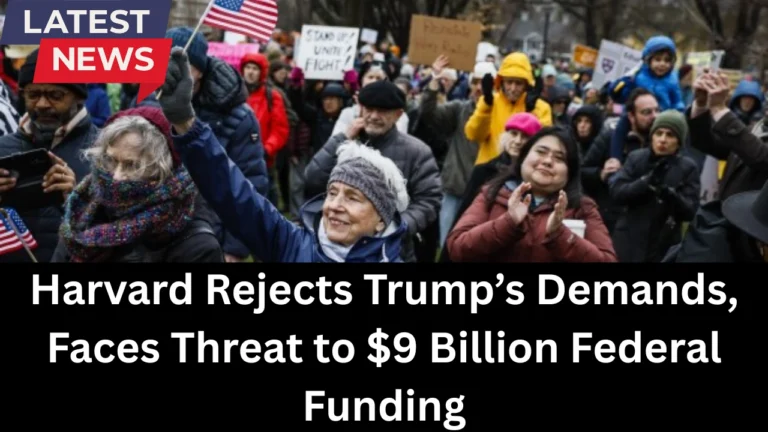In a bold and public stand against federal intervention, Harvard University has rejected a sweeping set of demands issued by the Trump administration, asserting that it will not compromise on its independence, academic freedom, or constitutional rights. The refusal has escalated tensions between one of the world’s most prestigious universities and the U.S. government, with the administration threatening to withhold nearly $9 billion in federal funding if Harvard does not comply.

The demands, part of what the Trump administration claims is a response to rising antisemitism on American campuses, have sparked a national debate on university autonomy, political overreach, and the role of higher education in a deeply polarized society.
Harvard University has rejected the Trump administration's demands for policy changes, putting nearly $9 billion in federal funding at risk https://t.co/tS2L9efscu
— CNN (@CNN) April 14, 2025
The Background: A Battle Over Campus Policies
The latest clash comes in the wake of pro-Palestinian student protests that erupted across many elite American universities following the October 7, 2023, Hamas attack on Israel. Harvard, like several others, was thrust into the spotlight over its handling of these protests and the broader campus climate concerning Israel-Palestine issues.
Under the banner of addressing antisemitism, the Trump administration has demanded sweeping changes at Harvard, including:
- Banning face coverings at protests
- Eliminating recognition and funding for student groups allegedly endorsing violence
- Enforcing “merit-based” admissions and hiring
- Auditing faculty and students based on their diversity-related views
- Imposing federal oversight over leadership, curriculum, and student body policies
Harvard’s Response: A Matter of Principle
In a strongly worded letter to the Harvard community, University President Alan Garber denounced the federal demands as unconstitutional and politically motivated.
“No government regardless of which party is in power should dictate what private universities can teach, whom they can admit and hire, and which areas of study and inquiry they can pursue,” Garber wrote.
Garber further argued that the proposed directives violate First Amendment protections and overstep the federal government’s authority under Title VI of the Civil Rights Act, which prohibits discrimination based on race, color, or national origin.
He emphasized that while the university has taken proactive steps to combat antisemitism on campus, the Trump administration’s actions indicate a broader attempt to regulate the intellectual and cultural fabric of private institutions.
Standing Firm on Autonomy and Academic Freedom
Harvard’s official website has since issued a defiant public statement:
“We will not surrender our independence or relinquish our constitutional rights. Neither Harvard nor any other private university can allow itself to be taken over by the federal government.”
The university’s alumni community has also rallied in support, with several prominent former students penning an open letter urging Harvard leadership to “legally contest and refuse to comply with unlawful demands that threaten academic freedom and university self-governance.”
Federal Crackdown on Academia
Harvard is not the only institution facing pressure. As part of what critics are calling an unprecedented campaign against higher education, the Trump administration has already:
- Revoked $400 million in funding from Columbia University in March
- Frozen dozens of federal research contracts at Princeton, Cornell, and Northwestern University
- Suspended $175 million in funding to the University of Pennsylvania over its inclusion of a transgender athlete in women’s swimming several years ago
These moves signal a broader political strategy aimed at reasserting federal control over universities, especially those seen as liberal or resistant to conservative cultural policies.
First Amendment Debate
Legal experts and education advocates are framing the Harvard-Trump standoff as a major First Amendment test case.
While federal funding often comes with conditions, Harvard maintains that the Trump administration’s directives veer into unconstitutional territory by attempting to control academic content, speech, and governance.
“The Constitution’s protection of free speech and academic freedom is not something to be negotiated. These demands are about ideological conformity, not student safety,” said one constitutional law professor at Yale.
Legal Showdown on the Horizon?
Many expect Harvard to challenge any federal funding cuts in court, potentially setting the stage for a landmark legal battle over the limits of government power in shaping university policy.
At stake are not only billions of dollars in federal research grants and student aid, but also the future role of higher education institutions as independent spaces for thought, research, and dissent.
A senior administrator at Harvard, speaking anonymously, said:
“This is about much more than money. It’s about who controls knowledge in America.”
Protests and Public Support
The decision to resist Trump’s directives has sparked rallies and protests on Harvard’s campus and in Cambridge more broadly. On April 12, 2025, hundreds of demonstrators gathered at Cambridge Common, holding signs that read “Hands off our campus” and “Academic freedom is not for sale.”
The protest was organized by the City of Cambridge and featured students, faculty, alumni, and civil liberties organizations.
A Pivotal Moment for U.S. Higher Education
The escalating conflict between Harvard and the federal government represents a turning point in the relationship between the state and academic institutions.
If Harvard loses access to $9 billion in federal funds, it could have ripple effects across higher education—impacting student financial aid, federally sponsored research, and global academic standing.
On the other hand, Harvard’s refusal may embolden other universities to push back against what many see as a political overreach.
Conclusion
Harvard University’s rejection of the Trump administration’s demands is more than an institutional decision it is a national statement on the boundaries of federal power, the sanctity of academic independence, and the enduring relevance of constitutional freedoms.
As legal and political tensions mount, the outcome of this standoff may reshape how American universities operate, govern, and resist pressure in an era of increasing ideological polarization.
Frequently Asked Questions
Why is Harvard University in conflict with the Trump administration?
Harvard refused to comply with federal demands regarding antisemitism, admissions, and campus policies, citing violations of its constitutional rights and academic independence.
What demands did the Trump administration make?
The administration demanded bans on face masks during protests, “merit-based” hiring and admissions, audits on diversity views, and oversight on campus groups and leadership.
How much funding does Harvard risk losing?
Harvard could lose up to $9 billion in federal research grants, student aid, and contracts if it does not comply.
What is Harvard’s response to the threat?
Harvard has stated it will not surrender its independence or constitutional rights and has signaled readiness for a legal fight.

